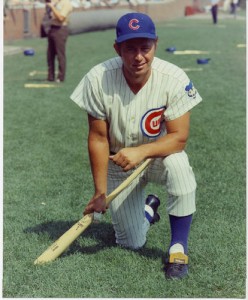By Any Measure Ron Santo Was a Hall of Famer
Sad news being reported this morning that former Chicago Cubs great Ron Santo has passed away at the age of 70. Though remembered by many for his great play as the third baseman for the Chicago Cubs from 1960 through 1973, in recent years he has been best known for his courageous battle with diabetes and his inexplicable omission from the Baseball Hall of Fame.
His combination of power and excellent defense made him the best third baseman in the National League throughout the 1960s. Santo was a nine-time All-Star and five-time Gold Glove selection.
From 1963 through 1970 he was consistently one of the best players in the league. He topped 30 home runs and 100 RBI four times during that stretch and had at least 26 home runs and 94 RBI in each of those eight seasons.
He finished in the top eight in the MVP voting four times, including fourth in 1967 when he hit .300 with 31 home runs, 107 runs scored and 98 RBI.
In 1969 he was fifth in MVP voting while finishing with 29 home runs and a career-best 123 RBI. However, that season is best remembered by Cubs fans for the collapse that saw the Cubs lose the NL East Division to the New York Mets by eight games after having led by nine games on August 16th.
It is that lack of having played on a winning team that many attribute as a major reason that Santo has never been able to take his rightful place in the Baseball Hall of Fame.
The statistics for his 15 year career, which ended with a single season with the Chicago White Sox in 1974, are comparable or better than a number of third basemen who have received the call from Cooperstown.
He blasted 342 career home runs and drove in 1,331 runs with a .277 batting average. Those numbers work out to 23 home runs and 89 RBI per season for 15 years, which is better than many players who have a plaque in the Hall of Fame.
Santo was eligible for the regular writer’s Hall of Fame voting from 1980 through 1998 and for some reason never received more than 43% (75% needed for induction). In four times being considered by the Veteran’s Committee, he has never received more than 61%.
Those numbers seem quite baffling considering that Santo was consistently recognized during his career as the best player in his league at his position. In modern terms, it would be comparable to fellow former Cub Ryne Sandberg not being in the Hall of Fame.
When comparing Santo to others from his own era, it is even more mind-boggling that Santo has never been included in the Hall of Fame.
Consider the case of former Pirate Bill Mazeroski, who entered the Hall of Fame by Veteran’s Committee selection in 2001. Mazeroski is considered one of the best fielding second basemen in baseball history, but his eight Gold Gloves are only slightly better than the five claimed by Santo. In addition, Mazeroski’s career offensive numbers of 138 home runs, 853 RBI and .260 average don’t hold a candle to those of Santo.
It is also arguable that Santo has been a victim of an unexplained bias by Hall of Fame voters against third basemen. I find it difficult to believe that in the 140+ year history of baseball there have only been 10 third basemen who are deserving of recognition by the Hall of Fame. Yet, that is the number of hot corner residents who have earned that recognition.
When compared to those 10, Santo is often listed among the top 10 third basemen of all-time. Only Eddie Mathews and Mike Schmidt blasted more career home runs and only Schmidt, Mathews, George Brett and Brooks Robinson drove in more runs. His .277 career batting average is also higher than that of Robinson (.267), Schmidt (.267) and Mathews (.271).
Over the last decade, Santo not only endured the disappointment of not having his Hall of Fame caliber career officially recognized, but he also lost both of his legs to his battle with diabetes. Through it all, he still held his head high and served as a color commentator for Cubs baseball games on the radio.
The Hall of Fame has again changed their procedures for selecting Veteran’s Era players and Santo will be considered along with others from the “Golden Era” for selection as part of the 2012 Hall of Fame class.
Though I hope he is selected, inducting Santo now that he has passed away will be very anti-climatic and one of several injustices that have been perpetrated by the Hall of Fame in recent years.
Another was not selecting Buck O’Neill to the Hall of Fame when a number of Negro League veterans were included but instead having him represent those recipients at the ceremony.
In addition, it is also mind boggling that former Dodgers great Gil Hodges has also never received his due. At least in Hodges’ case he didn’t have to spend a lifetime waiting for the prize that never came as he passed away suddenly in 1972.
Santo indicated previously that he did not want to be inducted posthumously, but also recognized that may indeed be the case.
Regardless, he knew that his numbers were deserving of induction and he certainly lived his life at a Hall of Fame level. May he rest in peace.

This is really interesting, You are a very skilled blogger. Ive joined your rss feed and look ahead to in quest of extra of your fantastic post. Additionally, I have shared your website in my social networks!cheap firefall gold